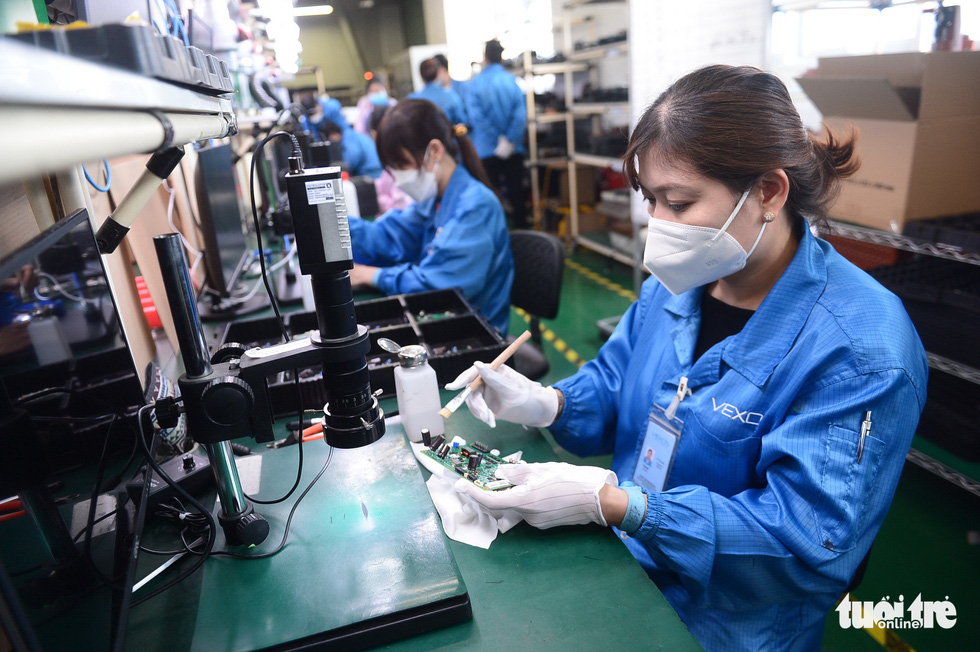Many multinational conglomerates such as Panasonic, Boeing, and Bosch have been committed to expanding their investment and maintaining long-term business in Vietnam, while also recommending solutions to better the investment environment in the country, a conference heard.
These commitments and solutions were announced at an online conference held on Saturday last week between the prime minister and foreign-invested enterprises (FIEs).
At the event, which was held virtually in Hanoi and connected to 63 centrally-run provinces and cities across the nation, many FIE representatives lauded Vietnam for its achievements in recent years, especially in the context of the COVID-19 pandemic and global uncertainties.
They also expressed their thanks for the constant support of the Vietnamese government.

This image shows workers at Vexos Vietnam Co. Ltd., a wholly foreign-invested enterprise at Tan Thuan Export Processing Zone in Ho Chi Minh City, Vietnam. Photo: Quang Dinh / Tuoi Tre
Nakajima Takeo, chief representative of the Japan External Trade Organization (JETRO) in Hanoi, said a recent JETRO survey of over 1,700 parent companies of Japanese firms revealed that Vietnam ranked second among countries in which companies want to expand their investments, according to the Vietnam News Agency.
Marukawa, from Panasonic Vietnam Co. Ltd., a wholly Japanese-invested enterprise, said his company's vision for development in the next 50 years in Vietnam is to become a leading provider of comprehensive health solutions.

However, his company is facing many serious problems such as shortage of raw materials, increasing transportation costs, and a lack of human resources, so it needs support from Vietnam’s agencies as well as from the country’s young talent development program.
Michael Vu Nguyen, country director of Boeing in Vietnam, said that the value of goods manufactured in Vietnam for Boeing amounted to US$200 million in the past years.
Therefore, Boeing will work with key suppliers to help them boost training, enhance technical and production standards, and make other improvements, the director said.
He also recommended that the Vietnamese government continue to support and facilitate the company’s key aviation suppliers in expanding investment and tapping new segments.
Meanwhile, the representative of Bosch, a German multinational engineering and technology company, expressed a hope for consistency in the laws that govern the business environment in Vietnam, for there exist cases in which a policy is subject to different laws that are not consistent with each other.
For example, the representative said, a manufacturing investment project of Bosch is recognized by the Law on Investment as a ‘new investment’ while under the Law on Corporate Income Tax, it is defined as an 'investment expansion' that is given a less attractive tax incentive policy.
Kim Young Chul, vice-chairman of the Korean Business Association in Vietnam, commented that in the context of inflation and supply chain disruption in the world, Vietnam is still highly valued thanks to its efforts to maintain stable prices and foreign exchange rates.
Kim also said Vietnam has a well-trained research and development force, but ‘brain drain’ is still happening, negatively affecting investment attraction and FIE expansion in Vietnam.
Therefore, he proposed that the prevention and control of ‘brain drain’ be included in the country’s Intellectual Property Law and Competition Law.
At the same time, Vietnam should have a more open visa policy to become a global tourism powerhouse and attract more foreign investment.
Meanwhile, the vice-president of the Singapore Business Association in Vietnam said that in the face of chip shortage in the world, the government should consider boosting chip production in Vietnam by offering special investment incentives, including financial support, to foreign investors in chip manufacturing.
Such incentives will help attract more investors in the chip manufacturing sector in Vietnam and promote the country as a leading chip manufacturer in the world, the vice-president said.
A representative of the European Chamber of Commerce in Vietnam called on the Vietnamese government to further promote the digital economy and ensure consistency between the country’s relevant laws and regulations and global standards, including the European regulatory framework.
At the same time, the country should strengthen human resource development in information technology, e-commerce, and digital transformation.
Speaking at the conference, Prime Minister Pham Minh Chinh said Vietnam creates all conditions to build a favorable, safe, and transparent environment for FIEs to feel secure to make long-term investment in Vietnam.
Source: Vinh Tho - Ngoc An / Tuoi Tre News